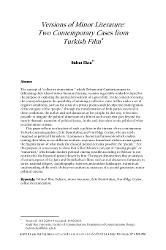| dc.contributor.author | Eken, Bülent | |
| dc.date.accessioned | 2020-08-31T10:54:09Z | en_US |
| dc.date.available | 2020-08-31T10:54:09Z | en_US |
| dc.date.issued | 2016 | en_US |
| dc.identifier.issn | 1301-7241 | en_US |
| dc.identifier.issn | 2149-9098 | en_US |
| dc.identifier.uri | https://hdl.handle.net/20.500.12469/3281 | |
| dc.identifier.uri | https://search.trdizin.gov.tr/yayin/detay/199901 | |
| dc.description.abstract | The concept of “collective enunciation,” which Deleuze and Guattari propose in
delineating their idea of minor literature/cinema, remains regrettably underdeveloped for
the purpose of exploring the political investment of a given film. In the context of cinema,
the concept designates the possibility of attaining a collective voice in film under a set of
negative conditions, such as the crisis of a private poetics and the objective disintegration
of the category of the “people,” through the transformation of both parties involved in
these conditions, the author and real characters as her people. In this way, it becomes
possible to imagine the political dimension of a film in such a way that goes beyond the
merely thematic treatment of political issues. In the end, this refers to the politics of what
is called minor cinema.
This paper reflects on the place of such a politics in the cinema of two contemporary
Turkish cinematographers, Zeki Demirkubuz and Nuri Bilge Ceylan, who are rarely
imagined as political filmmakers. It proposes a theoretical framework which enables
reading their films as two different aesthetic responses formulated within cinema against
the fragmentation of what made the classical political cinema possible: the “people.” For
this purpose, it is necessary to show that Gilles Deleuze’s concept of “missing people” or
“minorities,” which made modern political cinema possible according to Deleuze, is not
restricted to the historical period chosen by him. The paper demonstrates that an analysis
of certain aspects of Ceylan’s and Demirkubuz’s films, such as real characters, formation in
series, national allegory, autobiography, interiors and outdoor landscapes, warrants an
understanding of the work of these two authors as instances of a second generation, minor
political cinema. | en_US |
| dc.description.abstract | Deleuze ve Guattari’nin minör edebiyat/sinema fikrini açıklamak için ortaya attıkları
“kolektif bildirim” kavramından, verili bir filmin siyasi katmanlarını araştırmak için
yeterince yararlanılmadı. Bu kavram sinema baŞlamında, yazarın kendini içinde bulduŞu
kişisel bir dil yokluŞu krizi ile “halk” kategorisinin nesnel olarak zayıflayıp parçalanmaya
yüz tutması gibi olumsuz koşullar içinde kollektif bir söze ulaşabilme olasılıŞını anlatır.
Öyle ki, bu olasılıŞın gerçekleşmesi sözkonusu koşullara tâbi olan iki tarafın da (hem
sanatçı hem de sanatçının halkı olarak gerçek hayattan oyuncu) başkalaşması demektir.
Böylece bir filmin siyasi boyutunu sadece siyasi meselelerin konu edildiŞi tematik bir
sinema anlayışının ötesinde düşünmek mümkündür. Sonuçta minör sinema diye
adlandırılan da bu tür bir kollektif söz siyasetiyle belirlenir.
Bu yazı, pek de siyasi sinema örneŞi olarak görülmeyen Zeki Demirkubuz ve Nuri Bilge
Ceylan filmlerinde işleyen bu türden bir siyasetin yeri üzerine düşünmeye çalışıyor.
Burada önerilen kuramsal çerçeveye göre Demirkubuz ve Ceylan sineması, klasik siyasi
sinemayı olanaklı kılmış “halk” kategorisinin parçalanması karşısında geliştirilmiş farklı
iki estetik cevap olarak görülebilir. Bu sorunsalı açmak için Deleuze’ün “kayıp halk” ya da
“azınlıklar” kavramına başvurarak bu kavramların Deleuze’ce uygulandıŞı tarihsel dönem
dışında da geçerli olduŞunu gösteriyoruz. Yazı, Demirkubuz ve Ceylan’da rastlanan
profesyonel olmayan oyuncular, serileşme, ulusal alegori, otobiyografik öŞeler, iç
mekânlar ile dış manzaralar gibi bazı özelliklerden yola çıkan bir analizin bu sinemacıların
ikinci kuşak, minör bir siyasi sinemanın örnekleri olduŞunu gösterebileceŞini iddia ediyor. | en_US |
| dc.language.iso | eng | en_US |
| dc.publisher | İmge Kitabevi Yayınları | en_US |
| dc.rights | info:eu-repo/semantics/openAccess | en_US |
| dc.subject | Political film | en_US |
| dc.subject | Deleuze | en_US |
| dc.subject | Minor literature | en_US |
| dc.subject | Zeki Demirkubuz | en_US |
| dc.subject | Nuri Bilge Ceylan | en_US |
| dc.subject | Collective enunciation | en_US |
| dc.subject | Politik sinema | en_US |
| dc.subject | Minör edebiyat | en_US |
| dc.subject | Kollektif söz | en_US |
| dc.title | Versions of Minor Literature: Two Contemporary Cases from | en_US |
| dc.type | article | en_US |
| dc.identifier.startpage | 185 | en_US |
| dc.identifier.endpage | 206 | en_US |
| dc.relation.journal | Kültür ve İletişim | en_US |
| dc.identifier.issue | 37 | en_US |
| dc.identifier.volume | 19 | en_US |
| dc.department | Fakülteler, İletişim Fakültesi, Görsel İletişim Tasarımı Bölümü | en_US |
| dc.institutionauthor | Eken, Bülent | en_US |
| dc.relation.publicationcategory | Makale - Ulusal Hakemli Dergi - Kurum Öğretim Elemanı | en_US |
| dc.identifier.trdizinid | 199901 | en_US |
















